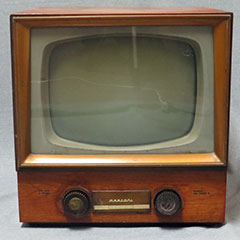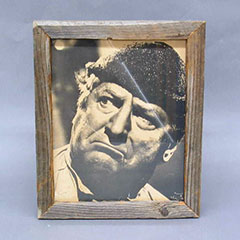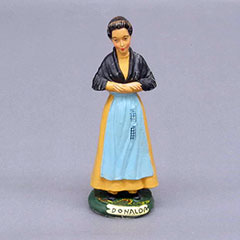Soap Operas
The First Television Serials (1946-1959)
Already familiar with serial dramas on the radio, the people of Québec quickly caught on to television serials. Of all TV genres existing in the 1950s, it is the one that lures the biggest audience. Its characters became true references in Québec’s pop culture. At the time, Claude-Henri Grignon’s Les Belles Histories des pays d’en haut, Louis Morisset and Mia Riddez’s Rue des pignons, Germaine Guèvremont’s Le Survenant, Guy Dufresne’s Cap-aux-sorciers, André Giroux’s 14, rue de Galais, and Robert Choquette’s La Pension Velder were among the most followed series. These programs’ unmistakable theme songs made an impression on the collective unconscious, just as their characters did.
La famille Plouffe
A pioneer in the genre, Les Plouffe by Roger Lemelin made the leap from radio to television in November 1953 under the title La famille Plouffe (The Plouffe Family). The series follows the daily life of a working-class family from Québec’s lower town. The dynamics of the masses are put forward in the series, which mirrors the living conditions and aspirations of the lower classes. La famille Plouffe became an example for other series. Its actors became the first stars of the small screen in Québec.
Les Belles Histoires des pays d’en haut
After 24 years on Radio-Canada’s airwaves, the characters from the radio serial Un homme et son péché migrated to television in Les Belles Histoires des pays d’en haut, the first episode of which was broadcast in October 1956. In a small village in the Laurentides region, Mayor and colonization agent Séraphin Poudrier is an influential man, instilling hate and submission in those around him. From 1956 to 1970, Radio-Canada presented hundreds of episodes of this series, which gave life to some of television’s most memorable characters in Québec.
Television Serials of the Quiet Revolution (1960-1969)
In the context of the Quiet Revolution of the 1960s, television serials conveyed a desire for emancipation present in Québec’s society, where familial roles were changing. Rue des Pignons (Des Pignons Street) is presented in 1966, depicting family life in one of Montréal’s working-class neighbourhoods. Between 1966 and 1970, Moi et l’autre (Me and the Other) is broadcast, a comedy starring Dominique Michel and Denise Filiatrault as Dominique André and Denise Létourneau. The two women give their building manager and concierge a hard time.
Television Serials with Individual Quests (1970 to 1995)
In the 1970s, fighting against fatality and authority takes a more discreet turn, but remains just as ambitious: never give up in the face of hardships. Life is tough, but not bleak. The 1980s put forth a new type of combativeness where “Québec Inc.” is established and ambitions are cranked up a notch. Prestigious series such as Lance et compte (Shoots and Scores) were part of this movement. This is when television serials introduced the 'mythic winner', stemming from a quest for success, be it individual or collective.
La Petite Patrie
In this television series, Claude Jasmin depicts a modest family’s daily struggles in Montréal’s Villeray neighbourhood. From 1974 to 1976, Radio-Canada broadcast 75 episodes of this series. Produced by Florent Forget, the program starred Jacques Galipeau and Gisèle Schmidt.
Lance et compte
On the air from 1986 to 1989 on Radio-Canada, this series revolutionized its genre, thanks to its rapid pace, action aplenty, outdoor scenes, and especially the symbolic figure of a winner at the centre of it all. Personal success became the new panacea. Pierre Lambert’s character embodied the aspirations of thousands of viewers.
Les filles de Caleb
Les filles de Caleb (Caleb’s Daughters) follows Émilie Bordeleau, a country schoolteacher, and Ovila Pronovost, an adventurer and enthusiast of wide-open spaces, in their tumultuous love story. One of the greatest successes of Québec television, Les filles de Caleb reached phenomenal audience ratings, with more than three million viewers.
The Societal Television Serials (1995 to 2000)
In the 1990s and 2000s, social issues made an appearance in many productions. Many authors used television series to raise controversial current affairs topics. The societal television series revealed a greater openness to the world. To the very private setting of kitchens, living rooms and bedrooms, are added offices, schools, businesses, courtrooms, sports arenas, and so on.
Omertà
Omertà is composed of 38 forty-five-minute episodes, written by Luc Dionne and broadcast from 1996 to 1999 on Radio-Canada. The series, composed of three parts, centres around an inventive and rather unorthodox policeman and his troubles with the mafia in Montréal. It stars Michel Côté and Luc Picard, and its soundtrack was composed by Michel Cusson.
Virginie
Virginie, a young teacher at Sainte-Jeanne-d’Arc High School, goes through many highs and lows in her classroom of struggling students, but also at the school in general, as well as in her private life. The Virginie series is composed of 1,740 twenty-five-minute episodes written by Fabienne Larouche. It was broadcast between 1996 and 2010 on Radio-Canada.



